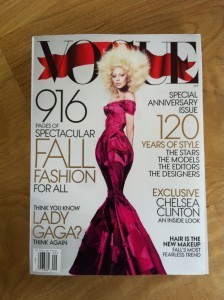Christopher Sprigman's Blog, page 14
August 23, 2012
If copying is killing the fashion industry, why is the September Vogue so thick?
 Yesterday, Vogue’s September 2012 issue hit my mailbox. And I mean “hit” rather literally. Vogue’s latest “September Issue”, the edition meant to pull women into the shops to buy their fall and winter outfits, is a whopping 916 pages. That’s a new record.
Yesterday, Vogue’s September 2012 issue hit my mailbox. And I mean “hit” rather literally. Vogue’s latest “September Issue”, the edition meant to pull women into the shops to buy their fall and winter outfits, is a whopping 916 pages. That’s a new record.
Which brings me to a point about copying in the fashion industry. As we’ve written before, copyright does not cover most fashion designs. We see the result every time we go shopping — the fashion world is full of knockoffs. But do they hurt the fashion originators? The ever-increasing heft of the September Issue suggests that the answer is no. The weight of the Vogue sitting on my dining room table is made up mostly of advertisements for fashion goods. The willingness of industry players to pay a pretty penny for placement in the September Issue is a good signal of what’s going on in the industry. People are making money. And copying doesn’t seem to have much effect on that.
 Now, maybe you can argue that in a world without knockoffs, fashion firms would rake in even more. For reasons we explain in The Knockoff Economy, we think that’s wrong. And just how thick could the September Issue get, anyway? My table is about to buckle under the weight as it is.
Now, maybe you can argue that in a world without knockoffs, fashion firms would rake in even more. For reasons we explain in The Knockoff Economy, we think that’s wrong. And just how thick could the September Issue get, anyway? My table is about to buckle under the weight as it is.
August 22, 2012
Can you trademark a marijuana “brand”?
 That’s the subject of our latest post at the Freakonomics blog. The answer might surprise you . . . .
That’s the subject of our latest post at the Freakonomics blog. The answer might surprise you . . . .
Twisted Sister to Romney/Ryan campaign: “We’re Not Gonna Take It”
 In the latest installment of a drama that plays out numerous times each election cycle, Dee Snider, the lead singer of ’80s hair-metal band Twisted Sister, is demanding that the Romney/Ryan campaign stop playing its now-ancient hit, “We’re Not Gonna Take It”, at campaign rallies. Just in the past weeks, similar demands have issued from L.A.’s Silversun Pickups and Paul Ryan’s (allegedly) favorite band, Rage Against the Machine. (Some enterprising journalist should ask Paul Ryan to name a single RATM song . . . .)
In the latest installment of a drama that plays out numerous times each election cycle, Dee Snider, the lead singer of ’80s hair-metal band Twisted Sister, is demanding that the Romney/Ryan campaign stop playing its now-ancient hit, “We’re Not Gonna Take It”, at campaign rallies. Just in the past weeks, similar demands have issued from L.A.’s Silversun Pickups and Paul Ryan’s (allegedly) favorite band, Rage Against the Machine. (Some enterprising journalist should ask Paul Ryan to name a single RATM song . . . .)
We understand that liberal musicians may not want their music to be associated with conservative politicians (most, but not all, of the complaints have this partisan alignment). But in most instances, the bands actually have no right to tell the politicians to stop. Why? Because, as one of us (Sprigman) and his UVA colleague and friend Siva Vaidhyanathan explain in this Washington Post op-ed, rights to publicly perform most popular songs are licensed by both politicians and venues as part of a “blanket” license offered by music licensing organizations such as BMI and ASCAP. So musicians can complain, but generally the law isn’t on their side. And that’s a good result, for reasons set out in the Sprigman/Vaidhyanathan op-ed.
August 21, 2012
Knockoff Songs
It’s such a fine line between stupid and clever between copying and referencing.
In music, copying is policed aggressively, and at least one American court has held that no more than 3 notes are enough to constitute copyright infringement. But what happens when what is copied is not specific notes or passages, but the overall sound and feel of a song?
This issue arises in many contexts (how many bands really have an original sound?) and one of the most interesting is advertising. There, so-called “sound alike” tracks crop up surprisingly often.
As the New York Times reported earlier this summer, the Baltimore-based band Beach House was repeatedly approached by an advertising firm for permission to use their 2010 song “Take Care” in a Volkswagen ad. They declined; Volkswagen persisted; and ultimately, after several rounds of unsuccessful wooing, Volkswagen’s ad firm had a knockoff recorded. The song sounded so much like Beach House that many fans of the band were confused.
What happens in these situations? Usually nothing. Some cases have used the state law concept of “right of publicity” to protect an especially-famous and distinctive sounding artist from having their voice or overall sound copied–as was the case with ads featuring sound alikes of Bette Midler and Tom Waits. But for most artists, they lack the distinction, fame and, most importantly, dollars to prevail.
RIP, Phyllis Diller — the queen of comedy
 Sad news that Phyllis Diller, one of the first female stand-up comics and an icon of the craft, has died at 95. Diller’s passing brings back a particularly sweet (and funny) memory. Back a few years ago I co-authored a paper with Dotan Oliar about how the community of stand-up comedians stops joke-stealing without resorting to copyright law. Stand-ups have their own system of “IP norms” — i.e., informal rules of conduct about who owns jokes, and the punishments for stealing one — that they enforce on one another. The norms are informal, but powerful, and they deter most joke stealing.
Sad news that Phyllis Diller, one of the first female stand-up comics and an icon of the craft, has died at 95. Diller’s passing brings back a particularly sweet (and funny) memory. Back a few years ago I co-authored a paper with Dotan Oliar about how the community of stand-up comedians stops joke-stealing without resorting to copyright law. Stand-ups have their own system of “IP norms” — i.e., informal rules of conduct about who owns jokes, and the punishments for stealing one — that they enforce on one another. The norms are informal, but powerful, and they deter most joke stealing.
That’s how comedians conduct themselves now, but it wasn’t always that way. In fact, prior to the 1960s, there were no norms against joke stealing at all. Instead, comedians lived in what they referred to as the “corn exchange” — they stole jokes from one another shamelessly. Some even celebrated their thievery — Milton Berle was celebrated as the “Thief of Bad Gags,”, and he used to joke that “the guy on stage before me was so funny that I dropped my pencil.”
As part of the research I did with Dotan on comedians’ norms, I spent a couple of days browsing through Phyllis Diller’s joke file, which is in the Smithsonian. It contains about 50,000 jokes, written or typed out on index cards and organized mostly by topic. There’s a lot of evidence there that Diller was an active member of the corn exchange. There are other comedians’ jokes in the file. There are also hundreds of panels from a comic strip, “The Lockhorns”, that chronicled a warring married couple. Diller refashioned some of these into jokes about her fictional husband, “Fang”.
But perhaps the best joke in the Diller file is one about the Supreme Court. “What has 18 legs, 9 heads, and 4 boobs?” she wrote. Punch line: “The Supreme Court.” She then crossedout the original joke and rewrote it in pen below, reflecting changes on the Court. “What has 18 legs, 3 boobs, and one black asshole?”
Yup.
Intellectual Ventures — innovation hothouse? Or patent troll?
 Well, probably a little bit of both, as detailed in this excellent article from CNET.
Well, probably a little bit of both, as detailed in this excellent article from CNET.
August 20, 2012
Plagiarism 101
 My UCLA colleague Russell Korobkin wrote an interesting dissection of the Fareed Zakaria plagiarism “scandal” (I put that in quotes, since it is not clear that his transgression was all the severe) on the popular Volokh Conspiracy blog (run by another UCLA colleague of mine.) The scandal involves quotes from a third UCLA colleague, Adam Winkler. It’s all in the family, in short.
My UCLA colleague Russell Korobkin wrote an interesting dissection of the Fareed Zakaria plagiarism “scandal” (I put that in quotes, since it is not clear that his transgression was all the severe) on the popular Volokh Conspiracy blog (run by another UCLA colleague of mine.) The scandal involves quotes from a third UCLA colleague, Adam Winkler. It’s all in the family, in short.
I think Russell makes some interesting points. Here’s a taste:
Plagiarism is usually understood to mean copying someone else’s ideas or expressions without attribution. In the case of ideas, the line between learning from others and plagiarism is nebulous. There is really not a lot new under the sun, and it would be preposterous to expect anyone to credit every idea in their head to its original source. If I think that we should lower taxes to encourage entrepreneurs to create jobs, and I got that idea from listening to one of Mitt Romney’s stump speeches, I don’t have to attribute the idea to him, just as he doesn’t have to attribute it to whomever gave him the idea originally (which he almost certainly doesn’t remember anyway). The reason is that the idea is widespread and general. In order to plagiarize an idea, the idea really must be very specific and unique.
In the case of expression, the same standard should govern, but it often seems not to.
For the whole thing, go here
August 19, 2012
Beck Reinvents the Album, 1912 style
Beck will release a new album in December, but it won’t come in the form of MP3s, CD or vinyl – instead, Beck Hansen’s Song Reader will be released by the publishing house McSweeney’s as individual pieces of sheet music.
“The Song Reader is an experiment in what an album can be at the end of 2012,” reads the post on Beck’s website announcing the project. “An alternative that enlists the listener in the tone of every track, and that’s as visually absorbing as a dozen gatefold”>LPs put together.”
At 108 pages comprising 20 individual song booklets, the Song Reader will feature 20 new tunes by Beck, 18 of them featuring lyrics and two instrumentals. The release will also include a hardcover carrying case, a foreword by Beck himself, and “full-color, heyday-of-home-play-inspired” original art from Marcel Dzama (who designed Beck’s album Guero), Leanne Shapton, Josh Cochran, Jessica Hische, and others.
August 17, 2012
Copying complaints about copying
 Plagiarism seems to be in the air lately. Fareed Zakaria is back at Time, though Jonah Lehrer remains (it seems) out at The New Yorker. It turns out that lawyers copy, or plagiarize, too. In fact, there is an interesting issue of “knockoff lawsuits” that we will return to in a future post.
Plagiarism seems to be in the air lately. Fareed Zakaria is back at Time, though Jonah Lehrer remains (it seems) out at The New Yorker. It turns out that lawyers copy, or plagiarize, too. In fact, there is an interesting issue of “knockoff lawsuits” that we will return to in a future post.
But today, we just note the interesting case of a copycat letter complaining about copying. LA’s own Silversun Pickups recently discovered that a song of theirs was used in a Romney campaign event. Their lawyer sent a cease and desist letter, as is common.
What’s interesting is that the letter tracks VERY closely (Zakaria-like closely) the language in a letter sent by the lawyer for former Eagle Joe Walsh to congressional candidate Joe Walsh (weird, right?). The Hollywood Reporter has the full story.





